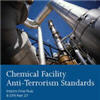
Chemical Industry Calls For Improved Implementation of Chemical Security Program
“Congress and the Administration have an opportunity to build on the chemical industry’s initiatives to enhance security by improving implementation of the Chemical Facilities Anti-Terrorism Standards (CFATS).” That’s according to Timothy Scott, Chief Security Officer and Corporate Director of Emergency Services and Security at The Dow Chemical Company, who testified on behalf of the American Chemistry Council (ACC) before the House Homeland Security Subcommittee on Cybersecurity, Infrastructure Protection and Security Technologies.
Scott emphasized the chemical industry’s leadership and its collaborative approach to enhancing security by working with policymakers to achieve a common objective.
“Members of ACC implemented the Responsible Care Security Code in 2002 and have voluntarily and significantly improved the security of its member facilities over the past decade,” said Scott. “Since the Security Code’s inception ACC members have spent nearly $10 billion on security enhancements. We have worked with the Department of Homeland Security (DHS) from the beginning to make CFATS successful.”
CFATS has come under increasing scrutiny from Congress as implementation issues have slowed the program’s progress. Scott urged Congress and the Administration to seize the opportunity to correct implementation issues while preserving the promise of the underlying program.
“We now have the catalyst for change and an excellent opportunity to correct the course and complete the task at hand,” said Scott. “The concept and basic design of CFATS are solid. CFATS has potential, has already sparked some improvements in chemical security and can be developed further into an efficient, productive process to improve the security of our nation’s critical chemical industry.”
However, Scott said specific improvements are needed to improve the overall implementation of CFATS. Specifically, he urged DHS to implement a more workable personnel security program for CFATS facilities to properly vet thousands of employees and contractors against the Terrorist Screening Database. He also urged DHS to engage chemical facilities and their trade group representatives throughout the process to improve/revamp Site Security Plan assessments and approvals.
Scott said DHS should improve transparency by making facilities aware of how CFATS risk tiering decisions are made by the Agency and how changes by the facility could reduce their risk and lower their CFATS profile. Finally, he urged DHS to consider an alternative inspection program for lower tier facilities using accredited third-party auditors—potentially leveraging ACC’s Responsible Care Security Code Program. This would help streamline the program by lessening the burden on the DHS inspection team and allow DHS to focus resources and attention on higher risk facilities.
“This will be a difficult task, but not an impossible mission. CFATS can work as conceived—implementation will take leadership, communication and collaboration well beyond what we’ve seen recently,” said Scott. “We—DHS, the industry and this subcommittee—can make this work.”